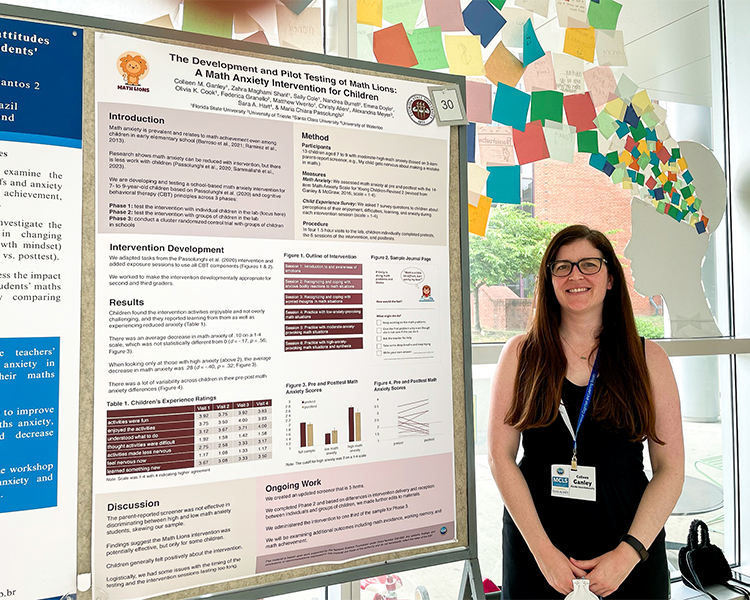Colleen Ganley, Ph.D.

Colleen Ganley, Ph.D.
Institute of Education Sciences Postdoctoral Research Fellow in Math Education, University of Illinois at Urbana-Champaign, 2011-2013
Ph.D. in Applied Developmental and Educational Psychology, Boston College, 2011
B.A., Psychology, Wheaton College, 2006
Colleen Ganley, Ph.D., is a faculty member with LSI’s Florida Center for Research in STEM (FCR-STEM) and holds a joint appointment in the Psychology Department as a professor of developmental psychology.
Her research interests involve understanding the social, cognitive, and affective factors related to math learning and science, technology, engineering, and mathematics (STEM) career interests. She is particularly interested in the early development of math anxiety, interventions for reducing math anxiety, and the role of parents and teachers in children’s math attitudes and learning. She has also focused in depth on understanding connections between domain-general cognitive skills, such as working memory and spatial skills, and math learning and performance.
In her work, she designs measurement instruments, collects and analyzes longitudinal data, and uses advanced statistical techniques. She also spends a lot of her time working to prepare datasets and other research materials to share with others through the Open Science Framework or LDBase.
Dr. Ganley’s research has been supported by the Institute of Education Sciences and the National Science Foundation. She also collaborates on multiple research grants from the National Institutes of Health. Her research has been published in journals in psychology and education including Child Development, Developmental Psychology, Developmental Review, Psychological Bulletin, Journal of Educational Psychology, Contemporary Educational Psychology, and the American Educational Research Journal.
Dr. Ganley received a Rising Star Award from the Association for Psychological Science in 2016 as well as the Early Career Research Contributions Award from the Society for Research in Child Development in 2017. She was recognized by Florida State University with the Developing Scholar Award in 2021 and received the Service Award from The Mathematical Cognition and Learning Society in 2025 in recognition of her work as Treasurer of the organization for 5 years.
Projects
- Examining the Mechanisms of the Math Anxiety-Math Achievement Link through a School-Based Grades 2-3 Intervention, National Science Foundation, Principal Investigator
- Examining Teacher Math Anxiety as A Malleable Factor Related to Student Outcomes, U. S. Department of Education / IES, Principal Investigator
- Shape of Educational Data, National Science Foundation, Principal Investigator
Select Publications
Geer, E. A., Barroso, C., Conlon, R. A., Dasher, J. M., & Ganley, C. M. (2024). A meta-analytic review of the relation between spatial anxiety and spatial skills. Psychological Bulletin, 150(4), 464–486.
Barroso, C., Ganley, C. M., Schoen, R. C., & Schatschneider, C. (2023). Between a growth and a fixed mindset: Examining nuances in 3rd-grade students' mathematics intelligence mindsets. Contemporary Educational Psychology, 73, 102179.
Barroso, C., Ganley, C. M., McGraw, A. L., Geer, E. A., Hart, S. A., & Daucourt, M. (2021). A meta-analysis of the relation between math anxiety and math achievement. Psychological Bulletin, 147(2), 134-168.
Ganley, C. M., Conlon, R. A., McGraw, A. L., Barroso, C., & Geer, E. A. (2021). The effect of brief anxiety interventions on reported anxiety and math test performance. Journal of Numerical Cognition, 7(1), 4-19.
Geer, E. A., Quinn, J. M., & Ganley, C. M. (2019). Relations between spatial skills and math performance in elementary school children: A longitudinal investigation. Developmental Psychology, 55, 637-652.
Ganley, C. M., Schoen, R. C., LaVenia, M., & Tazaz, A. M. (2019). The construct validation of the Math Anxiety Scale for Teachers. AERA Open, 5, 1-16.
Hart, S. A., & Ganley, C. M. (2019). The nature of math anxiety in adults: Prevalence and correlates. Journal of Numerical Cognition, 5, 122-139.
Ganley, C. M., & McGraw, A. L. (2016). The development and validation of a revised version of the Math Anxiety Scale for Young Children. Frontiers in Psychology, 7, 1181.
For a full list of publications, see here: http://www.mtllabfsu.com/publications.html

